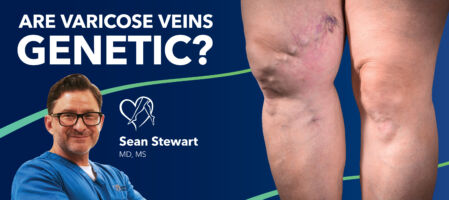
Medically reviewed by Sean K. Stewart, MD, MS, on February 21, 2025
Varicose veins are characterized by enlarged and twisted vessels, usually in the legs. They form when the valves inside the veins don’t work properly, causing blood to flow backward and build up. The pressure on the veins increases, making them swell.
Research shows that if your family has a history of varicose veins, you may be more likely to develop them as well. While genetics plays an outsized role, factors such as standing for long periods, being overweight, and not getting enough exercise are also known contributors to varicose veins.
In this blog, we examine how genetics influence varicose veins and explore how professional treatments can help manage the root condition—chronic venous insufficiency—and prevent it from worsening.
If you’re ready to get started on your path to improved vascular health, book a consultation at a Center for Vein Restoration vein clinic near you by calling 240-249-8250 or visiting our SCHEDULING PORTAL.
According to the American Heart Association Journal of Circulation, varicose veins affect approximately 33 percent of people in the United States and are often hereditary.
In addition to these factors, the science is sound: a study by the National Library of Medicine (NIH) discovered that if one of your parents has varicose veins, you also have a higher chance of getting them. This is because the condition follows a genetic pattern called autosomal dominant inheritance, which can be passed down from parent to child.
While genetics plays a major role, they are not the only factor contributing to the development of varicose veins. Several other lifestyle and environmental factors can increase the risk of developing varicose veins, such as:
Are you concerned that you may have a DVT blood clot? CVR offers a DVT rule-out service for same-day or next-day diagnosis and treatment plans. Call our hotline at 877-SCAN-DVT (844-568-3691).
While genetics can’t be changed, there are proactive steps you can take to prevent or manage varicose veins, even if you are genetically predisposed. Some tips to keep in mind include:
Genetics or other risk factors are sometimes unavoidable, even if you take steps to prevent varicose veins. Fortunately, CVR offers a variety of professional, minimally invasive treatments to help reduce or eliminate varicose veins, providing a renewed sense of comfort to our valued patients:
Vein treatment by board-certified CVR vein physicians addresses the root problem of chronic venous insufficiency by targeting and repairing damaged or malfunctioning valves within the veins, restoring proper blood flow, and preventing venous reflux.
Now we understand that genetics play a key role in determining whether you’ll develop varicose veins, but they are not the only factor. Age, gender, lifestyle, and environmental factors also play major roles. The takeaway? Being proactive about your vein health is particularly important if you are genetically predisposed to vein disease.
CVR’s board-certified physicians address varicose veins before they become more severe and cause debilitating symptoms. Our team of vein specialists offers personalized treatment plans tailored to your specific needs, helping you regain your vein health with every step of the personalized vein treatment process.
If you’re already dealing with varicose veins, don’t wait for the problem to worsen. Professional treatment can help relieve symptoms and restore the comfort of your legs. Schedule an appointment today to take the first step toward better vein health and overall well-being.
Call 240-249-8250 or visit us online to book your consultation—and get ready to look and feel better—you won’t regret it!